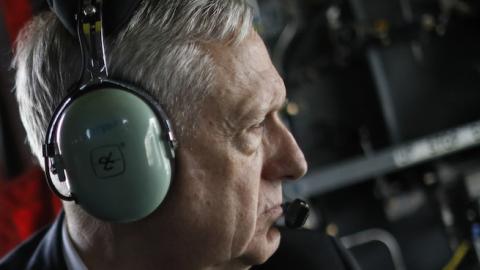During his ongoing whistle-stop tour of the Middle East, U.S. Defense secretary General Jim Mattis, faces the difficult task of building an effective coalition against Iran and Sunni Islamist terrorism with the help of Arab allies that felt neglected by the Obama administration. He must also find a way of negotiating through the thicket of different regional priorities and divergent national and regime interests of America’s various allies.
Mattis apparently reassured leaders of Saudi Arabia, Egypt and Israel that the Trump administration would strengthen traditional alliances with their governments, focusing on containing Iran and fighting terrorism. Israel likely will face less pressure over the Palestine issue while Saudi Arabia and Egypt can expect breathing space over human rights.
The Middle East is not home to many functioning democracies. Even Israel, which has proudly espoused western democracy in a region where others did not practice it, cannot help but get tarred because of its actions in the West Bank. While the U.S. should not give up its ideals or its hopes of democratizing the Middle East, Mattis has made it clear that strategic considerations will once again be the priority.
Mattis said in Riyadh that the United States was serious in containing the ‘malign influence’ or Iran, a statement that was probably music to the ears of his Saudi hosts. “Everywhere you look, if there’s trouble in the region, you find Iran,” he declared, adding that the U.S. would work with nations in the region to “checkmate Iran and the amount of disruption, the amount of instability they cause.”
An anti- Iran coalition similar to the one assembled in 1991 against Saddam Hussein’s invasion of Kuwait seems possible, with Egypt and Saudi Arabia as its mainstay. The Trump administration will probably continue to work with both governments privately on issues where they disagree, as demonstrated in the quiet diplomacy that secured the release from Egypt of American charity worker, Aya Hijazi.
Arab governments would prefer private discussions on issues of divergence rather than public shaming.
The U.S. Middle East coalition will most represent a wide spectrum of policies and behavior, ranging from the model ally United Arab Emirates (UAE) to recalcitrant partner Qatar, which hosts a U.S. military base on the one hand and funds extremist clerics and activists on the other.
The U.A.E.’s forces have participated in more joint operations with U.S. forces than any other country in the region. The Emiratis demonstrated their resolve against ISIS by having one of their women pilots participate in bombing ISIS targets. U.A.E. leaders seem to believe in talking less and doing more, joining the U.S. in containing Iran as well as in building a counter-narrative to serve as a bulwark against extremist ideology that contributes to the rise of Jihadi terrorists.
“In the UAE, we believe it is possible to be Muslim, moderate, and modern at the same time,” declared the UAE ambassador to the U.S., Yousef al Otaiba in an oped in the Wall Street Journal. The Gulf country may not be a full democracy with a hundred percent record on human rights by western benchmarks but it does represent an unusually open and inclusive society by the region’s standards, with expanding participation of women and tolerance for religious minorities.
On the other end of the spectrum of U.S. allies in the Middle East stands Qatar, which continues to promote an anti-modern religious narrative and provides financial assistance and safe haven to individuals and groups deemed terrorists or terrorist financiers by the U.S. and others in the international community.
Qatar’s support goes to a wide range of bad actors ranging from the Afghan Taliban to Al-Qaeda in Syria, Libyan Islamist militias and Hamas in Gaza. Qatar also sees the Egyptian Muslim Brotherhood differently than other U.S. allies in the region who consider it as the ‘mother ship’ of radical Islamism.
Doha, Qatar’s Capital, is home to Shaikh Hajaj al-Ajmi and Sheikh Shafi al-Ajami, both identified by the United States government as fund-raisers for Al Qaeda’s Syrian affiliate Al-Nusra, and several other extremists preaching jihad against the west and promoting an Islamist ideology of clash of civilizations. Members of the Egyptian and Syrian Brotherhood have lived in Doha for decades, including Egyptian cleric Yusuf al Qaradawi. Brotherhood personalities have been able to disseminate their views through Al Jazeera, funded by Qatar, since the mid-1990s.
Currently, at least a half-dozen United States-designated terrorist fund-raisers, some designated years earlier, continued to frequent Doha.
Qatar is now viewed as the biggest backer of the Muslim Brotherhood and Islamist groups in the region. Qatar’s argument is that it does not want to break ties with conservative religious scholars and groups that have popular roots but in effect it continues to provide oxygen to radical beliefs at a time when others, notably U.A.E. but also increasingly Saudi Arabia and Egypt are trying to build a counter-narrative for political Islam.
While building a coalition against Islamist extremists and Iran, the U.S. should not allow itself to be manipulated by Qatar in its position as home to a U.S. military base. Americans would end up fighting endless wars in the Middle East if Qatar-backed extremists continue to recruit, train and equip new terrorists at the same time it allows the U.S. to launch military missions from its soil.

















